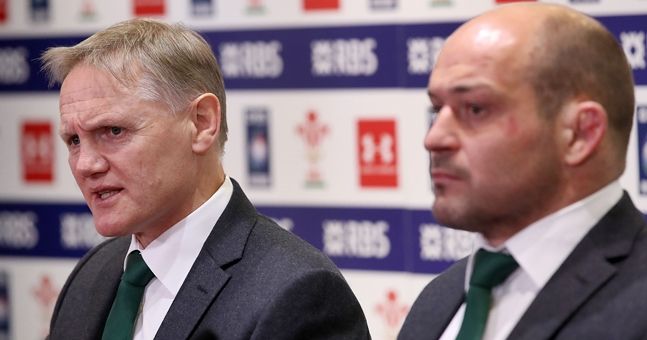The inside pass. The 'Leinster Loop'. The reliance on Murray and Sexton. The way you can disrupt Ireland's entire game-plan by disrupting their line-out and keeping scrums to a minimum.
Joe Schmidt was not in Wellington in October 2011 but last night in Cardiff felt an awful lot like that poxy day in the World Cup.
Back then, Ireland went into the game as favourites. They had beaten Australia to open up one side of the draw. Some of their players were being touted as world-beaters. Their back row was lauded as immense.
Wales did them.
On Friday, we were told by Irish and Welsh voices, Schmidt's men would stave off their host's brute force and bluster. It would be a tough hour but they would pull away at the end. Ireland had Conor Murray and Johnny Sexton. Ireland had the best back row in the championship.
Wales did them.
Ireland were in scorpy form after
their 22-9 loss at the Principality Stadium. Played up as a bag a fertiliser all week, George North monstered them. Told he was third fiddle to Murray and Ben Youngs all championship, Rhys Webb shredded them. Questioned as a captain after Scotland, Alun Wyn Jones wreaked lineout havoc and tasted yet another win over the men in green.
It felt an awful lot like Wales saw us coming from a mile off.
Murray and Sexton were roughed up. Nothing illegal but every bit as painful. Tackled with intent; marks made. Our lineout fell apart on crucial throws at crucial moments. The loops and inside passes looked good but rarely resulted in metres.
https://twitter.com/Woolberto/status/840312209934819329
None from CJ Stander, Sean O'Brien or Jamie Heaslip could say they played great.
And so the question was asked of both Schmidt and Rob Howley, Wales' caretaker boss. Are Ireland too predictable. When asked by Ciarán Ó Raghallaigh, Howley shook his head and grinned:
"A Joe Schmidt side predictable? Come on. They're a quality attacking side."
Schmidt sat in the same seat Jones had occupied 15 minutes previous and frowned as Newstalk's Dave McIntyre asked him if his side were too predictable in attack.
"In what way?"
McIntyre clarified that, with the maul failing to generate legal scores and the lineout faltering, Ireland seemed to settle on the bulldozer approach in close. Schmidt replied:
"It's funny you say that Dave. In the end, you're always looking for variation. We'd seven line breaks each. A lot of the stats are very, very even. Unfortunately, probably the one that favours us is the 10-4 penalty count and the one that favours them is the 22-9 scoreline.
"For us, we'll look at the performance more than the result and say, 'The seven line breaks we did make, how did we create those? Did we play with width?' I don't think anyone can say we didn't play with width. Sometimes inside the [Welsh] twenty-two, some of the ball was very slow. It makes it very hard."

Schmidt wrapped up his answer by going back to the penalty count versus the scoreboard and attempted to divert any questions about how Wayne Barnes refereed the game.
The press briefing ended with English journalists attempting to tee up next weekend's game against their country. Schmidt conceded another Six Nations had alluded Ireland but insisted his team would try to finish on a high.
With the briefing over, the Kiwi nodded his head but looked anything but happy as he left the room.
He may not have liked the word "predictable" being used but he may expect to hear it a lot over the next seven days.



 Schmidt wrapped up his answer by going back to the penalty count versus the scoreboard and attempted to divert any questions about how Wayne Barnes refereed the game.
The press briefing ended with English journalists attempting to tee up next weekend's game against their country. Schmidt conceded another Six Nations had alluded Ireland but insisted his team would try to finish on a high.
With the briefing over, the Kiwi nodded his head but looked anything but happy as he left the room.
He may not have liked the word "predictable" being used but he may expect to hear it a lot over the next seven days.
Schmidt wrapped up his answer by going back to the penalty count versus the scoreboard and attempted to divert any questions about how Wayne Barnes refereed the game.
The press briefing ended with English journalists attempting to tee up next weekend's game against their country. Schmidt conceded another Six Nations had alluded Ireland but insisted his team would try to finish on a high.
With the briefing over, the Kiwi nodded his head but looked anything but happy as he left the room.
He may not have liked the word "predictable" being used but he may expect to hear it a lot over the next seven days.